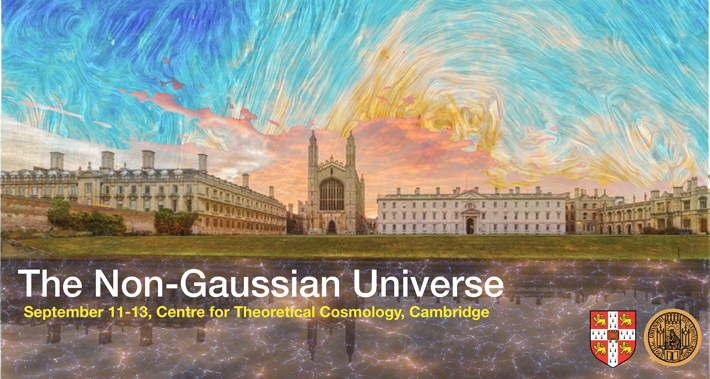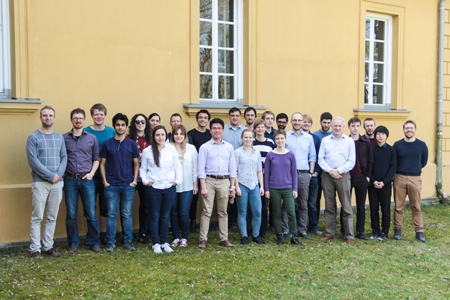Cambridge/LMU Munich cosmology partnership and September workshop, "The Non-Gaussian Universe"
The Centre for Theoretical Cosmology has entered into a partnership with the Ludwig Maximilian University in Munich that brings together two world-leading groupings in theoretical cosmology, arguably the best known internationally in both the UK and Germany. The programme kicked off in early April with a visit by CTC faculty, postdocs and PhD students to Munich to initiate the exchange of ideas and expertise (a group of 15 researchers made up the Cambridge delegation). The next development in the collaboration is a more substantial workshop entitled, "The Non-Gaussian Universe", hosted by CTC from 11-13 September this year which will explore critical statistical tests of fundamental theory in light of new observations, especially huge galaxy surveys; over 20 Munich researchers are expected to attend.
The first collaboration meeting in Munich on 1-3 April 2019 was held at the Arnold Sommerfeld Center for Theoretical Physics for the first two days and then at the University Observatory for the last day (with the group pictured below), reflecting the interdisciplinary links the partnership endeavours to foster. Given longstanding connections between Cambridge and Munich cosmologists, we discussed common areas of interest and existing synergies, while also exploring new areas for joint collaboration. There are special opportunities to exploit complementary expertise at the two institutions, for example, the cross-correlation between the cosmic microwave background (Cambridge) and huge galaxy surveys (LMU). There is a strong mutual interest in non-Gaussian statistics that can uncover the nonlinear evolution of large-scale structure, both at late times through gravitational collapse and potentially in the early universe by identifying the signatures of new fundamental particle interactions. A number of areas for interaction were uncovered and a strong case was made for the September workshop.
There is a much broader range of overlapping interests in cosmology at the two institutions, covering dark energy and dark matter – particularly the phenomenology of axions – as well as galaxy formation, hydrodynamical simulations and black holes. Our collaboration will also endeavour to foster interactions on some of these topics, but there is considerable scope for expanding activities across a much broader range. From a Cambridge perspective, the collaboration could encompass many more researchers from the Kavli Institute of Cosmology (involving members from the Institute of Astronomy and Cavendish Astrophysics). We also noted the strong participation in Munich from members of the Max Planck Center for Astrophysics, so deepening links in that direction would undoubtedly also prove fruitful.
The Non-Gaussian Universe workshop
Further information about the forthcoming meeting can be found at the website:
http://www.ctc.cam.ac.uk/activities/ng/
The meeting will explore the following topics: primordial non-Gaussianity to provide important clues about inflation and fundamental theory, late-time non-Gaussianity from nonlinear gravitational collapse in large-scale structure, and signatures in the cosmic microwave sky. The workshop will feature a mixture of keynote and short talks, with a focus on leaving plenty of time for discussion and interaction. As well as being a collaboration meeting, we have invited external experts to advise on each of these subjects, to review recent results in the field, and to forecast the potential for new observations, especially huge galaxy surveys. This workshop is organised by the Centre for Theoretical Cosmology at DAMTP in Cambridge and will be held from September 11 to September 13, 2019.
Further information
More information about the LMU’s cosmological research can be found at these sites:
https://www.theorie.physik.uni-muenchen.de/cosmology/
https://www.physcos.physik.uni-muenchen.de/
The CTC and the LMU have spearheaded theoretical modelling of inflation and the early universe for decades. Our objective is to develop this new partnership into a world-leading centre of excellence in the confrontation between cosmological theory and observation. Building on our multidisciplinary research in the cosmological microwave background and large-scale structure, we will play a leading role when next-generation survey data is analysed and interpreted, notably from the Simons Observatory and the Euclid satellite.


